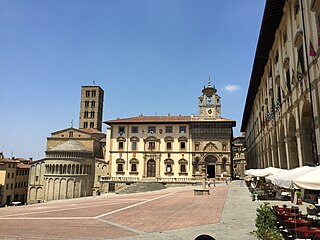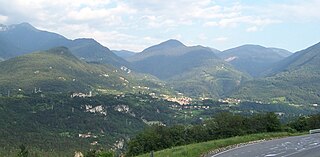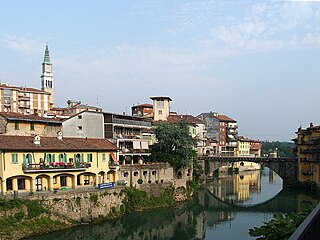
Arezzo is a city and comune in Italy and the capital of the province of the same name located in Tuscany. Arezzo is about 80 kilometres southeast of Florence at an elevation of 296 metres (971 ft) above sea level. As of 2022, the population was about 97,000.

Domenico Modugno was an Italian singer, actor and, later in life, a member of the Italian Parliament. He is known for his 1958 international hit song "Nel blu dipinto di blu", for which he received Grammy Awards for Record of the Year and Song of the Year. He is considered the first Italian cantautore.

The Basilica dei Santi Giovanni e Paolo, known in Venetian as San Zanipolo, is a church in the Castello sestiere of Venice, Italy.

Berzo Demo is an Italian comune in Val Camonica, province of Brescia, in Lombardy, northern Italy.

Bienno is an Italian comune in Val Camonica, province of Brescia, Lombardy. It is a member of the I Borghi più belli d'Italia association.

Mario Luzi was an Italian poet.

Carloforte is a fishing and resort town located on Isola di San Pietro, approximately 7 kilometres off the southwestern coast of Sardinia, in the Province of South Sardinia, Italy. It is a member of the I Borghi più belli d'Italia association.

The Barbaro family was a patrician family of Venice. They were wealthy and influential and owned large estates in the Veneto above Treviso. Various members were noted as church leaders, diplomats, patrons of the arts, military commanders, philosophers, scholars, and scientists.

Castelnuovo di Garfagnana is a town and comune in the province of Lucca, Toscana, central Italy. It is located at the confluence of the Serchio and the Turrite Secca rivers, close to the intersection of roads passing through the Apennine Mountains and the Apuan Alps.

Ponte San Pietro is a comune in the province of Bergamo, Lombardy, northern Italy. It is about 40 kilometres (25 mi) northeast of Milan and about 7 kilometres (4 mi) west of Bergamo.

Fosciandora is a comune (municipality) of 554 inhabitants in the Province of Lucca in the Italian region Tuscany, located about 70 kilometres (43 mi) northwest of Florence and about 30 kilometres (19 mi) north of Lucca.

Saint Sabinus of Canosa, venerated as a saint in the Roman Catholic church, was bishop of Canosa di Puglia from 514.

Traditions of Italy are sets of traditions, beliefs, values, and customs that belongs within the culture of Italian people. These traditions have influenced life in Italy for centuries, and are still practiced in modern times. Italian traditions are directly connected to Italy's ancestors, which says even more about Italian history.

Folklore of Italy refers to the folklore and urban legends of Italy. Within the Italian territory, various peoples have followed one another over time, each of which has left its mark on current culture. Some tales also come from Christianization, especially those concerning demons, which are sometimes recognized by Christian demonology. Italian folklore also includes the genre of the fairy tale, folk music, folk dance and folk heroes.
Antonio Nardini was an Italian historian and author.
Santi Pietro e Paolo is the Baroque-style Roman Catholic cathedral in the center of the town of Castelnuovo di Garfagnana, region of Tuscany, Italy.

Neccio, also called niccio, ciaccio, or cian, is a galette made with chestnut flour, typical of some mountain zones of Tuscany and Emilia, in Italy, and on the island of Corsica, in France.
Pietro Ciotti is an Italian professional footballer who plays as a right back for Serie D Group H club Fidelis Andria.
Events during the year 2023 in Italy.
















